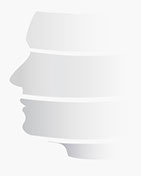Tension Headache Prevention
A few medications taken at regular intervals may reduce the frequency and severity of attacks of tensions headaches, but in general the chronic form of this headache is a more difficult headache to treat with daily preventive medications. If you have frequent tension headaches that aren't relieved by OTC analgesic medication and nondrug therapy such as stress management, you are a candidate for preventative medication. Also, if your headache pain becomes disabling or causes you to overuse pain medication, or if you can't take pain medication because of other medical conditions you may also be a candidate. Preventive medications may require several weeks or more to build up in your nervous system before they take effect. Overusing caffeine or painkillers for acute relief may reduce the effect of the preventive drug.
Typical Prevention Medication Classes
Antidepressants:
Tricyclic antidepressants, including amitriptyline (Elavil) and nortriptyline (Pamelor), are the most commonly used medications to prevent tension headache. They're effective against both the episodic and chronic forms. Side effects of these medications may include weight gain, drowsiness, dry mouth and constipation.
Antidepressants such as paroxetine (Paxil), venlafaxine (Effexor, Venlafaxine HCL Er) and fluoxetine (Prozac) produce fewer side effects than do the tricyclic antidepressants but aren't as effective for tension headaches or in most cases do not help at all.
Tricyclic Antidepressants
SSRIs
Anticonvulsants and Muscle Relaxants:
Topiramate (Topamax) and gabapentin (Neurontin), and muscle relaxants, such as tizanidine (Zanaflex) or cyclobenzaprine (Flexeril) .
Site Map
Disclaimer




